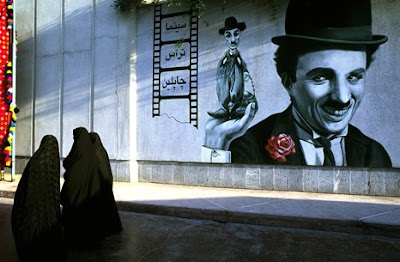The government continues to supress demonstrations , and blames the West on government television, even showing "confessions" of protesters supposedly incited by western media outlets. The Iranian bloggers make clear that no one is fooled by this, but since the Supreme Leader decided to show his hand and intervene in the elections, he doesn't have a choice but to play his role and go on with the act, leaning on his security forces. Although Khameini has succeeded in making the public demonstrations diminish significantly, the unrest persists in the minds of the people. It seems clear that this isn't simply going to go away. The clamp down on the media, scare tactics on the party leaders and reformists, violence on protesters, and monitoring of Internet comunications may have calmed things down to an extent on the surface, but underneath the tension hasn't gone away. So far the government has been threatening to arrest Mousavi; if they do, a general strike may like...






